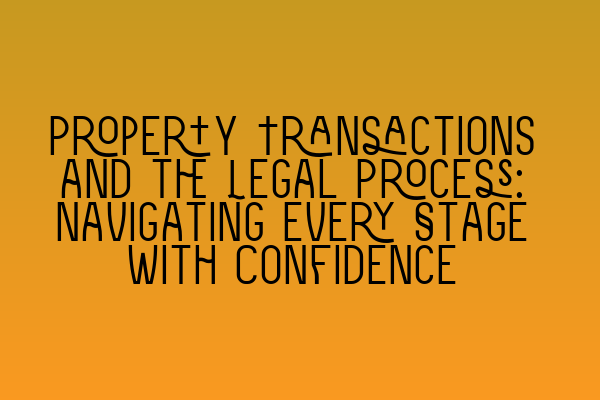Property Transactions and the Legal Process: Navigating Every Stage with Confidence
Buying or selling a property is a significant milestone in anyone’s life. Whether it’s your first home, an investment property, or a commercial space for your business, the legal process can be both exciting and daunting. In this article, we will guide you through each stage of a property transaction, providing expert insights and tips to help you navigate with confidence.
Stage 1: Pre-Contract
The pre-contract stage of a property transaction involves gathering information and conducting due diligence. Here are some key steps:
- Property Search: Before committing to a purchase, it’s crucial to conduct a thorough property search. This includes inspecting the property, requesting relevant documents (such as title deeds and planning permissions), and checking for any legal issues that may affect the transaction.
- Funding and Finance: If you require a mortgage, it’s essential to secure financing before proceeding. Consult with a mortgage advisor to explore options and ensure you have a solid financial plan in place.
- Survey and Valuation: Consider hiring a qualified surveyor to assess the property’s condition and determine its market value. This will help you make an informed decision and negotiate the price effectively.
- Offer and Negotiation: Once you have gathered all the necessary information, you can make an offer to the seller. Negotiation may be required to reach a mutually acceptable price.
For a comprehensive understanding of the legal aspects and considerations in the pre-contract stage, we recommend reading our article on The Importance of Ethics in Contract Law: A Comprehensive Guide.
Stage 2: Contractual Agreements
Once you and the seller have agreed on the terms, the next stage involves entering into contractual agreements. Here’s what you need to know:
- Exchange of Contracts: At this point, both parties will sign the contract, and a deposit (usually 10% of the purchase price) is paid. This legally binds both parties to the transaction.
- Completion Date: A completion date is agreed upon, generally a few weeks after the exchange of contracts. On this day, the balance of the purchase price is paid, and the property officially changes hands.
- Conditions and Contingencies: Contracts may include various conditions and contingencies, such as the completion of necessary repairs or the resolution of outstanding legal matters. Ensure you understand these clauses and seek legal advice if required.
If you want to test your knowledge of contract law and the intricacies of contractual agreements, consider taking our Interactive SQE Mock Tests for Contract Law: Test Your Knowledge.
Stage 3: Completion and Post-Completion
The completion stage is when the property transaction is finalized, but there are still important steps to follow:
- Transfer of Title: The legal ownership of the property is transferred from the seller to the buyer through the registration of a transfer deed.
- Payment of Stamp Duty: Stamp Duty Land Tax (SDLT) is payable on most property transactions. Ensure you understand the current rates and deadlines for payment.
- Land Registry: Submit the necessary documents to the Land Registry to update the property’s ownership records and officially register yourself as the new owner.
For more detailed insights into the post-completion stage of a property transaction, we recommend reading our article on Contract Law Reforms: An Analysis of Recent Changes.
Conclusion
Property transactions can be complex, but with proper guidance and a clear understanding of each stage’s legal processes, you can navigate the journey confidently. Remember to seek professional legal advice when needed, conduct thorough due diligence, and stay informed about any changes or reforms in property and contract law.
If you’re interested in further expanding your knowledge of contract law, we invite you to attend our informative SQE Contract Law Webinars: Expert Insights and Guidance.
